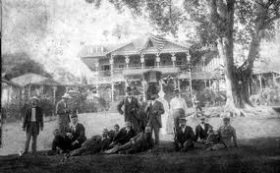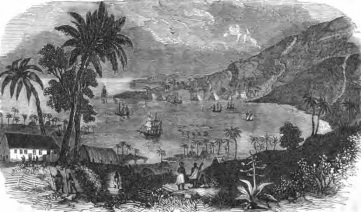Effects on the Hawaiian People

When Captain James Cooke arrived in Hawaii in 1778, there were about 300,000 native Hawaiians on the islands; however, disease from the new outsiders greatly reduced the native population. Today, about 20 percent of Hawaii's people are of native Hawaiian ancestry, and only about 10,000 are of pure Hawaiian descent. As more outsiders flowed into the island, the native Hawaiians grew poorer, less healthy, and less educated than members of the other new major ethnic groups on the islands.
Sugar growers, who dominated the islands' economy, imported thousands of immigrant laborers first from China, then Japan, then Portuguese from Madeira and the Azores, followed by Puerto Ricans, Koreans, and Filipinos. As a result, Hawaii has one of the world's most multicultural populations. No longer does Hawaii have it's own culture, but instead it has a mix of cultures from all over the world.
Most of the Hawaiian natives were pushed into small, low end parts of the island to make a living on their own. Many ended up living in poor neighborhoods. Where the natives were pushed back to, the farm land was poor and contributed to their poverty.
In this video, Bruddah Iz expresses his loyalty to the "Hawaiian Nation".
Sugar growers, who dominated the islands' economy, imported thousands of immigrant laborers first from China, then Japan, then Portuguese from Madeira and the Azores, followed by Puerto Ricans, Koreans, and Filipinos. As a result, Hawaii has one of the world's most multicultural populations. No longer does Hawaii have it's own culture, but instead it has a mix of cultures from all over the world.
Most of the Hawaiian natives were pushed into small, low end parts of the island to make a living on their own. Many ended up living in poor neighborhoods. Where the natives were pushed back to, the farm land was poor and contributed to their poverty.
In this video, Bruddah Iz expresses his loyalty to the "Hawaiian Nation".
Still Bitter Feelings

Due to the manner in which the U.S. annexed Hawaii, some people feel that America did the wrong thing. They believe that their ancestors were cheated out of their free, tradition rich nation and cruelly treated. Though this may be true in some cases, some Americans feel that if we did not annex Hawaii, Japan or other countries would, and would have been just as cruel or even worse. Furthermore, many American believe we did exactly what Mark Twain said, "We can afflict them with our wise and beneficent government...We can make that little bunch of sleepy islands the hottest corner on earth." However; there are still groups of natives that believe they should have been their own nation, and therefore they choose to live in isolated communities refusing to believe that what America did was for the better.
